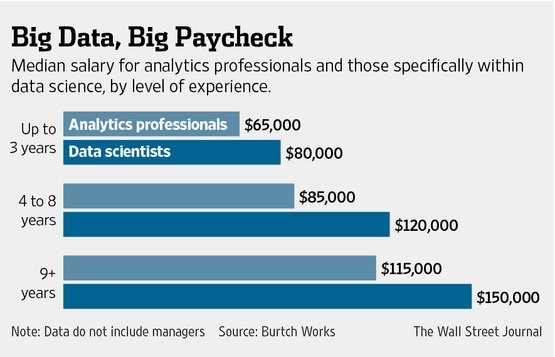MS in Data Analytics
An Overview of the Degree
In today’s world, data rules us all. Our shopping habits, travel plans, entertainment experiences, education etc. all run through the internet. And all these internet activities generate enormous amounts of data.
Since the late 1990s, companies have been working on utilizing all this data for a different purpose altogether. Big Data is a term used to refer to an amount of data that is so large that conventional database tools prove inept at handling it. Companies like Google and Amazon foresaw the potential of using this data and started investing in this domain. All this requires serious computational skills and training in analytical tools. This led to the creation of a new profession altogether – data scientists. Data Science is an amalgamation of Mathematics, Statistics, Analytics and Computer programming. A recent IBM study has even reported that there will be a rapid growth in Data Science jobs, with 2.7 million new Data Scientist and Analytics jobs opening every year, by 2020. This only proves that Data Analytics is here to stay.
MS in Data Analytics is an ideal coursework for graduates aspiring to progress in this niche domain of data analytics. It is very helpful to increase your potential and moreover combines concepts of mathematics, computing, engineering, and business to develop problem-solving skills.
Along with this, Masters of Science in Data Analytics prepares you to succeed in industries which deal in data such as banking, healthcare, government, insurance companies, and management by allowing you to develop and assess strategies. Also, irrespective of your previous academic background, this program accommodates a range of learners who are interested in the field of data analytics with either a technical or business related aspect.
Due to the freshness of this profession, many graduates are not aware of the wide range of opportunities that this course has to offer apart from a glowing career and great salary.

Is the Masters of Science in Data Analytics Program worth it?
For the students interested in enhancing their technical and problem-solving skills which are the priority requirements of the employers, the Masters of Science in Data Analytics is the right fit for you.
Also, for those who aim to implement an independent research and analyze solutions in the field of data analytics, this program is a good choice.
Many universities send their graduates for advanced commercial research where they are given proper research environment with a variety of resources available at hand.
Furthermore, Universities like the Warwick have divided the program into two components namely the taught component and a dissertation. The taught component focuses more on acquiring expertise in technical skills. On the other side, the dissertation primarily focuses in the domain of research and application of complex topics with the assistance of industry workers.
Thus, this course can give you a great chance to build your network in the industry long before you actually join the industry.
Elective Courses
All the schools catering this program offer a wide variety of optional courses.
Few of the elective courses which a student studying MS in Data Analytics can choose are:-
| Data Storage & Management | Programming for Data Analytics |
| Analytical CRM | Natural Language Processing |
| Urban Data | Social Informatics |
| Algorithmic Game Theory | Visualization |

Duration of MS in Data Analytics Program
The duration of this course is normally between 18 to 36 months depending on the School chosen.
The course is usually divided over 3 or 4 semesters with a mandatory project and internship in most of the schools.
How to decide if a program is good?
There are a lot of analytics programs out there and it is difficult to compare them as each program is very different from another. However, there are some parameters you must keep in mind while choosing a program for yourself.
1) Curriculum
The first and also the most important step in choosing a program is deciding what do you actually want to study. Most schools put up the entire curriculum on their websites which you can go through. Usually, the coursework is divided into two sections – core courses and electives. Going through these would give you an idea of what the program is all about and you can choose accordingly.
2) Industry Collaborations
Data science is a highly application-oriented field. Hence, you require a good amount of practical training. This training could come in the form of internships, capstone projects, research collaborations etc. Hence, check out the list of companies and the kind of opportunities they are offering before choosing a program.
3) Class Profile
While it is important what you learn, it’s equally important who you learn it with. The collaborations with your peers will be an important part of your education. Class profile information is usually available on the school websites and this could come in handy while deciding between schools.
4) Return on Investment
Let’s face it, higher education abroad is expensive. If you pay an exorbitant amount of fees and still end up struggling for a job, the situation is worrisome then. Hence, you should compare the total expenses and placements before choosing a school. These stats are readily available on college websites and would help you make a better decision.
Admission requirement for MS in Data Analytics programs
Students who aim to get admitted to a good school for the MS in Data Analytics must be comfortable with complex mathematical problems and have some knowledge about programming and basic computers.
However, those applicants who are not familiar with mathematics and computing can also get admission provided they take preparatory courses in Math and Computers before they join the class.
Some schools like the NYU require you to complete courses in Calculus, Linear Algebra, Computer Programming, Advanced Physics, and Engineering. Also, you are required to have obtained the first degree to an international standard of 2:1. However, failing to have this, applicants with work experience in the industry are also considered equally for the course.

Admission Process
The most important factor for getting admission in this course is to have 3 glowing letters of recommendation along with your essays and statement of purpose. The final selection is, however, based upon the comprehensive evaluation of your application. This includes the test scores, extracurriculars, and work experience. Any experience in the computer industry is an added advantage.

Which test scores are required?
The GMAT or GRE official test score is an essential element of your application. All top universities demand a high score on these standardized tests to evaluate your mental and intellectual abilities.
Additionally, English Language Proficiency test scores are required along with the application. Some universities accept IELTS while others require TOEFL( minimum score of 100) for international applicants.
Class Profile
Here is an example of a general class profile of MS in Data Analytics:
Class Size – 65
Median GMAT – 710
Median Quantitative GRE – 165
Age Range – 22 to 42
Average Work Experience – 1 Year
Average International Students– 45%
Background of student – Mathematics & Statistics (34%), Engineering (20%), Economics (16%) and Other Sciences (30%)
Some of the top employers hiring in this field are Facebook, Google, Amazon, eBay, Paddy Power, Capgemini, Mozilla, IBM
Pharmaceutical Industry: Janssen, Merck, GSK, J&J
Financial services Industry: Bank of Ireland, AXA, EY, Accenture, Deloitte, Citi, HSBC
Average MS in Data Analytics Salary
An entry-level data analyst with a Masters Degree might get an average salary around $50,000-$75,000 per year. As experience increases, the average salary for a data analyst increases to higher numbers.
Also, here are some of the job profiles besides Data Analyst position that are offered post completion of the degree –
1) Business Consultant
2) Data Scientist
3) Marketing Analyst
4) Business Analyst
5) Analytics Consultant
6) Data Solutions Architect
According to the University of San Francisco, the median salary for a MS in Data Analytics Graduate with 1-2 years of experience is $110,000 per year and can reach upto a maximum of $130,000 per year.
More than 95% graduates receive an offer of employment with the first three months of graduation from this program.

Schools that offer MS in Data Analytics
In no particular order, here is a list of Schools that offer this program:-
| School Name | Country | Program | |
| 1 | Massachusetts Institute of Technology | USA | Master of Business Analytics |
| 2 | Carnegie Mellon University | USA | Master of Information Systems Management: Business Intelligence & Data Analytics |
| 3 | Columbia University | USA | Master of Science in Applied Analytics |
| 4 | Texas A&M University | USA | Master in Analytics |
| 5 | Duke University | USA | Master of Quantitative Management |
| 6 | Northwestern University | USA | MSc in Analytics |
| 7 | University of San Francisco | USA | MSc in Analytics |
| 8 | University College Dublin | Ireland | MSc in Data Analytics |
| 9 | Cardiff University | UK | MSc in Data Science & Analytics |
| 10 | Deakin University | Australia | Master of Data Analytics |
| 11 | University of Central Florida | USA | MSc in Data Analytics |
| 12 | University of Chicago, Graham School | USA | MSc in Analytics |
| 13 | Georgia Tech | USA | MSc in Analytics |
| 14 | RMIT University | Australia | Master of Analytics |
| 15 | Ryerson University | Canada | MSc in Data Science & Analytics |
| 16 | Dublin Business School | Ireland | MSc in Data Analytics |
| 17 | National College of Ireland | Ireland | MSc in Data Analytics |
| 18 | University of Glasgow | UK | MSc in Data Analytics |
| 19 | Informatics Institute of Technology | Sri Lanka | MSc in Big Data Analytics |
| 20 | University of Hildesheim | Germany | MSc in DA |
| 21 | University of Minnesota-Twin Cities | USA | Master of Science in Business Analytics |
| 22 | New York University | USA | Master of Science in Business Analytics |
| 23 | University of Virginia | USA | Master of Science in Commerce: Business Analytics Track |
| 24 | University of California-Davis | USA | Master of Science in Business Analytics |
| 25 | Rutgers University | USA | Master of Business & Science in Analytics: Discovery Informatics & Data Sciences |
| 26 | Michigan State University | USA | Master of Science in Business Analytics |
| 27 | Boston University | USA | Online Master of Science in Applied Business Analytics Management |
| 28 | University of Iowa | USA | Master of Science in Business Analytics |
| 29 | Arizona State University | USA | Master of Science in Business Analytics |
| 30 | UNIVERSITY OF CONNECTICUT | USA | Master of Science in Business Analytics & Project Management |
| 31 | SOUTHERN METHODIST UNIVERSITY | USA | Master of Science in Business Analytics |
| 32 | Essec Business School | France, Singapore | MSc in Data Sciences & Business Analytics |
| 33 | ESCP Europe | France, Germany | Master in Big Data and Business Analytics |
| 34 | IE Business School | Spain | Master in Big Data and Business Analytics |
| 35 | Esade Business School | Spain | MSc In Business Analytics |
| 36 | Universita Bocconi | Italy | Data Science & Business Analytics |
| 37 | Ieseg School of Management | France | MSc in Big Data Analytics for business |
| 38 | Melbourne Business School | Australia | Master of Business Analytics |
| 39 | Naveen Jindal School of Management | USA | Master of Science in Business Analytics |
| 40 | Kent Business School | UK | MSc in Business Analytics |
Future Scope
Big data is growing bigger day by day. For example- Walmart collects over 2.5 petabytes (1015bytes) of data every hour from its customers’ transactions. Data is not only helping us take business decisions but rather dictating the company policies itself. In such a scenario, analytics is definitely here to stay.
Analytics as a domain has exploded primarily because it offers businesses to save on the three most important parameters – Time, Money and People. Use of analytics means less time taken to process data which translates into saving money and using fewer people for the same work.
The world of Analytics started in the 1990s with Analytics 1.0 which was mainly limited to Business Intelligence. Pre-defined queries and already structured data was mainly used for processing. During this era, more time was spent on structuring and preparing data as compared to actually processing the data for analysis. Then in the 2000s, the world evolved to welcome Analytics 2.0 or Big Data analytics. Big Data couldn’t be processed in time on a centralized platform and hence open source frameworks like Hadoop were created. The data that was processed was not only larger but also unstructured.
However, now the data is becoming too large for even these frameworks to handle. Today, a humongous amount of data is being created every second and the traditional ways of doing analytics are no longer viable. Keeping data in a centralized location is no longer feasible and hence people are working on Analytics 3.0. It is essentially a combination of traditional business intelligence, big data, and Internet of Things (IoT) distributed throughout the network. Companies like Google, Amazon, Facebook are heavily investing in analytics thus strengthening the faith in analytics as an essential part of every company.
All in all, we can safely conclude that analytics is here to stay and its importance will only increase in the future.
If you need a detailed profile evaluation of your chances at MS in Data Analytics program, then check out the MiM Profile Evaluation. It will give you a good assessment of your strengths, weaknesses and overall chances at Masters in Data Analytics.